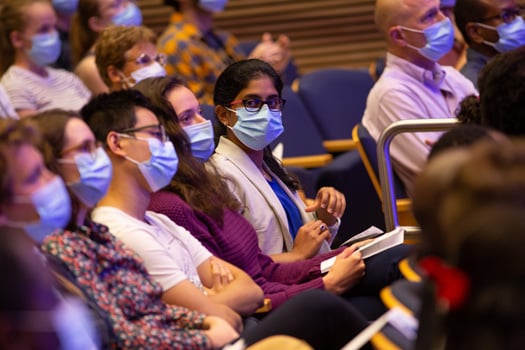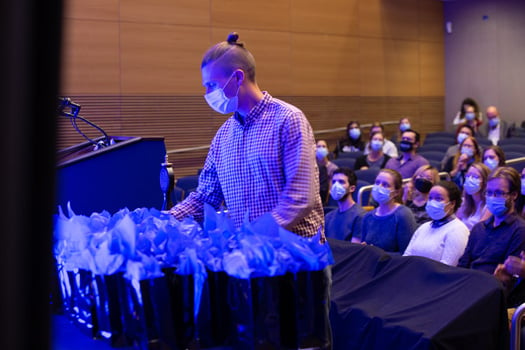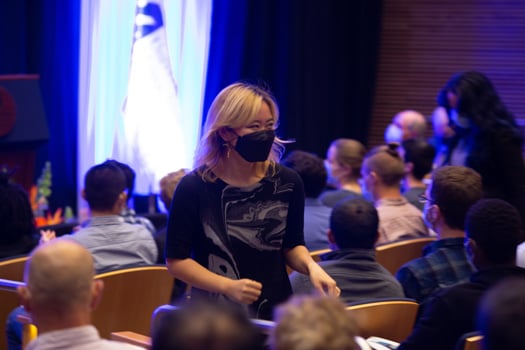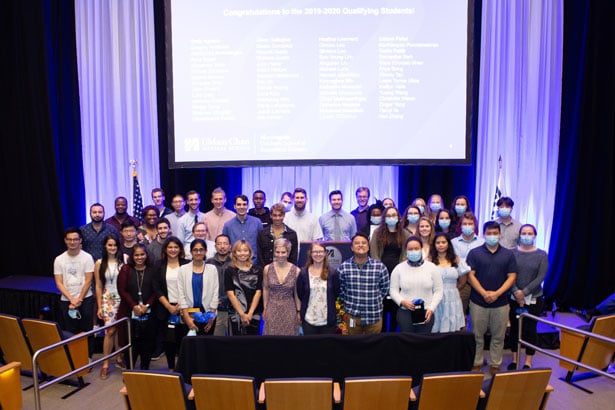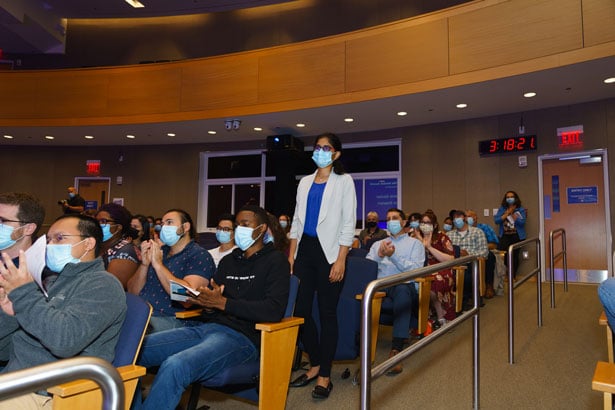A year after holding its Qualifying Exam Recognition Ceremony on Zoom, the Morningside Graduate School of Biomedical Sciences at UMass Chan Medical School gathered in the Albert Sherman Center Auditorium on Tuesday, Sept. 14, to mark the transition from student to scholar, or, as Mary Ellen Lane, PhD, dean of the Morningside Graduate School of Biomedical Sciences, called it in her remarks, “from knowledge consumer to knowledge creator.”
“While the advances that make our lives longer and healthier and better are often produced outside of the university, it is in the universities where the ideas that fuel these advances are born,” Dean Lane said. “As emerging scholars, you have the privilege and the responsibility to make recognizable contributions to the ideas that are born here at our institution.”
Passing the qualifying exam is a significant milestone for PhD students because it marks their transition to formal candidates for doctoral degrees. On Tuesday, the 57 new doctoral candidates received business cards with the new Morningside Graduate School of Biomedical Sciences branding on them and laser pointers.
As their dissertation work begins, students were cautioned by Lane to avoid falling into the trap of focusing more on work output than connectivity and cohesion. She acknowledged that it’s been difficult to make connections these past 18 months. PhD students have had to do some work in isolation, take classes and seminars on Zoom and squeeze in lunch during 15-minute mask breaks. But, she said, social interactions make science possible.
“A chance meeting in the hallway, or a lingering conversation over lunch, or during the slow procession out of a crowded auditorium after a great seminar, or at a poster session, can spur a collaboration, inspire your next experiment, or make you think differently about your data,” Lane said. “Let’s be intentional in our engagement and interactions as we continue creating opportunities and experiences for new ideas to flourish.”
Chancellor Michael F. Collins spoke about what can happen when connections are made.
“While one of you might make the discovery of the gene that is defective, or the mechanism that is in need of correction so that we could actually cure a disease, it then becomes a collaboration of the work of that science within a group of folks who can translate that into a therapeutic or biologic of some sort, and then it comes together with the clinicians in both the medical and nursing school,” Chancellor Collins said.
“We need you,” said Provost Terence R. Flotte. “We need you in ways we can’t anticipate—you as our future scientists—to solve all the great problems that our century will present to you.”
The significance of the Qualifying Exam Recognition Ceremony was not lost on Qiu Yu (Judy) Huang who uses a 3D structural biology technique to investigate influenza viruses and how the structure of influenza viruses can affect function. She is mentored by Celia Schiffer, PhD, the Gladys Smith Martin Chair in Oncology, professor of biochemistry & molecular pharmacology, and founding director of the Institute for Drug Resistance.
“I’m no longer just someone who takes in the knowledge, but now I do actually have a very instrumental role in the discovery of new things,” Huang said. “I think for junior students, it’s often hard to take authority in what you do and to confidently say that you’re able to conduct science at an academic level. Now I can go out and tell people that I am a PhD candidate and a scientist.”
Suk Namkung is doing genomic research in the labs of Guangping Gao, PhD, the Penelope Booth Rockwell Professor in Biomedical Research, professor of microbiology & physiological systems, director of the Horae Gene Therapy Center and co-director of the Li Weibo Institute for Rare Diseases, and Phillip Tai, PhD, assistant professor of microbiology & physiological systems.
“We are ready to move on to the next phase and become scientists who can independently carry out our own projects with little guidance,” Namkung said.
Before calling up those who were admitted to doctoral candidacy during the 2020–21 academic year to receive their gift bags, Lane asked the students who were admitted to doctoral candidacy in the 2019–20 academic year—students who didn’t have an in-person ceremony—to stand and be recognized.Stephanie Becker and Aparna Sreeram received the Zelda Haidak Memorial Scholarship. Douglas Golenbock, MD, the Neil and Margery Blacklow Chair in Infectious Diseases and Immunology and professor of medicine, is Becker’s mentor; John Landers, PhD, professor of neurology, is Sreeram’s mentor. Now in its fourth year, the Haidak scholarship, which supports female trainees working in the area of cell biology, is named in honor of Zelda S. Haidak, the wife of late faculty member Gerald L. Haidak, MD.
The following students were admitted to doctoral candidacy in academic year 2020-21:
Milky Abajorga, Jeremy Luban and William Theurkauf Labs
Cesar Bautista Sotelo, Michael Lodato Lab
Eric Beaudoin, Elizabeth Shank Lab
Stephanie Becker, Douglas Golenbock and Michael Heneka Labs
Bethany Berry, Mark Johnson Lab
Julianna Buchwald, Anastasia Khvorova and Paulo Martins Labs
Ezequiel Calvo, Athma Pai Lab
Qiaoxi Chen, Matthew Alcusky Lab
Haoyang Cheng, Erik Sontheimer Lab
Sarah Cleveland, Eric Huseby Lab
Alexandre Dinis, Egil Lien Lab
Zachary Dyer, Arlene Ash and Jay Himmelstein Labs
Shawn Egri, Kuang Shen Lab
Katarina Ferrucci, Kate Lapane and William Jesdale Labs
Rachel Fontana, Michael Lee Lab
Melissa Goulding, Stephenie Lemon Lab
Nicholas Harper, Michael Lee Lab
Qiu Yu (Judy) Huang, Celia Schiffer Lab
Julie Hugunin, Kate Lapane Lab
Feston Idrizi, Nathan Lawson Lab
Ailsa Jeffries, Michael Lodato Lab
Roy Jung, Chinmay Trivedi Lab
Emmet Karner, Arthur Mercurio Lab
David Keener, Jonathan Watts Lab
Tasia Kellogg, Vanni Bucci Lab
Ekaterina Korobkina, David Guertin Lab
Carolyn Kraus, Erik Sontheimer Lab
Timmy Lê, Gilles Martin Lab
Thomas Leland, Marian Walhout Lab
Michael Lero, Leslie Shaw Lab
Ethan Loew, Beth McCormick Lab
Emily Lowry, Amir Mitchell Lab
Jiang Min, René Maehr Lab
Shrutika Mintri, Kate Fitzgerald Lab
Kathryn Monopoli, Anastasia Khvorova and Dmitry Korkin (WPI) Labs
Molly Murphy, Neal Silverman Lab
Suk Namkung, Guangping Gao and Phillip Tai Labs
Mariana Noto Guillen, Amir Mitchell Lab
Thomas Nyalile, Jeremy Luban Lab
Humberto Ochoa, Craig Mello Lab
Abiola Ogunsola, Samuel Behar Lab
Peter Oluoch, Christopher Sassetti Lab
Pooja Parameswaran, Megan Orzalli Lab
Cole Pero, Craig Mello Lab
Kenley Preval, Gregory Pazour Lab
Naideline Raymond, Pranoti Mandrekar Lab
Lucas Restrepo, Eric Baehrecke Lab
Iris Valeria Rivera-Flores, Anastasia Khvorova Lab
Benjamin Sallis, Beth McCormick Lab
Divya Shridharmurthy, Shao-Hsien Liu Lab
Aparna Sreeram, John Landers Lab
Claire Tocheny, Leslie Shaw Lab
Simon Wentworth, Miguel Esteves Lab
Qiangzong Yin, Oliver Rando Lab
Abigail Zeamer, Vanni Bucci Lab
Danni Zhao, Kate Lapane Lab
Max Zinter, Andrew Tapper and Travis Thomson Labs
Related stories on UMassMed News:
GSBS recognizes 56 doctoral candidates in virtual ceremony
GSBS recognizes 57 students for achieving milestone in biomedical sciences graduate training
GSBS recognizes 52 graduate students as they embark on dissertation research
